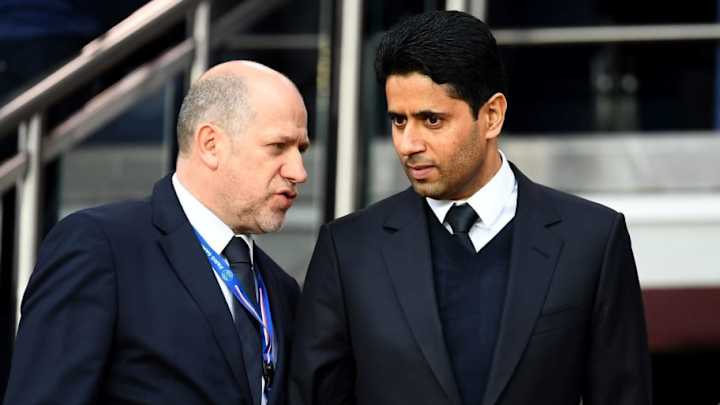PSG President Nasser Al-Khelaifi Charged With Corruption for Part in Qatari Athletics Bid

Paris Saint-Germain president Nasser Al-Khelaifi has been charged with corruption for his part in Qatar's bids for the world athletics championships in 2017 and 2019.
The charges were administered by a French judge as part of an investigation into bribery claims relating to both the unsuccessful bid for the 2017 championships - which were ultimately held in London - and the successful one for the tournament this year.
The payments in question totalled £2.8m, and according to reports from AFP news agency, were allegedly provided by Oryx Qatar Sports Investment, a firm Al-Khelaifi owns alongside his brother Khalid, and given to a firm run by the son of the ex-president of the world athletics governing body (the IAAF), Lamine Diack.
Diack was charged in relation to the case in March, which was when the investigation into the PSG boss began, while a warrant is out for the arrest of Lamine's son, Papa Massata Diack. Al-Khelaifi was initially brought in to the case voluntarily, after he agreed to appear before a judicial inquiry investigating the case in March.
However, so far the 45-year-old has vehemently denied any wrongdoing, with his lawyer, Francis Szpiner, citing the allegations as "totally inaccurate". Speaking to Le Parisien, as quoted by Goal, Szpiner proclaimed: "Nasser Al-Khelaifi's name does not appear on any of the documents in the file.
"It should be noted that Nasser Al-Khelaifi's initial hearing was only the result of a regrettable confusion by the investigating magistrate. Nasser Al-Khelaifi has never been operationally involved in Doha's bid for the World Athletics Championships."
#BREAKING PSG president Nasser Al-Khelaifi charged with corruption over Qatar world athletics championships: source pic.twitter.com/FR1BDvRgTL
— AFP News Agency (@AFP) May 23, 2019
As per BBC News, he later continued: "Nasser Al-Khelaifi was neither a shareholder, nor a director of Oryx in 2011. He did not intervene either directly or indirectly in the candidature of Doha."
It is understood that he will be contesting the charge, though it must be stated that the word used in French court which translates to 'charged' - 'mis en examine' - does not automatically trigger a trial, and merely means that the prosecutors 'strongly expect wrongdoing'.
